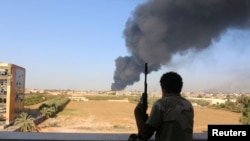Libya says 22 people were killed in a day of fighting in Tripoli between rival militias vying to take control of the capital's international airport.
The interim government announced the death toll Sunday from the fighting the day before between Islamist militias from the coastal city of Misrata and the mountain town of Zintan, combatants who once fought side by side to oust longtime Libyan dictator Moammar Gadhafi in 2011.
The government said the "heavily armed groups" had shelled "civilian targets," the latest chapter in fighting that has claimed more than 200 lives in recent weeks.
The militia shelling set fire to eight huge oil depots, sending plumes of black smoke billowing into the air over Tripoli.
Libya is facing some of its worst violence since Gadhafi was toppled. It has renewed fears that Libya is plunging deeper into civil strife and forced several countries to evacuate their diplomats and close their embassies.
Saturday's fighting at the airport came as Libya's newly-elected parliament held its first meeting in the eastern city of Tobruk.
More than 150 members of parliament gathered under tight security for the meeting, which was headed by interim speaker Abu Bakr Baiera.
Baiera said parliament's official opening session was postponed until Monday, as the difficult security situation prevented some lawmakers from attending Saturday's gathering.
Reports indicate the lawmakers who did not show included Islamists - a possible sign of continuing political divisions.
Britain's ambassador to Libya, Michael Aron, tweeted Friday that his embassy was suspending operations and temporarily moving its offices to Tunisia. The United States, United Nations and Turkey had already removed their staff from Libya. Other countries have recommended that their nationals in Libya leave immediately.
In neighboring Egypt, President Abdel Fattah al-Sissi raised concerns about Libya's deteriorating security situation and called on the international community to help restore order.
He told a news conference Saturday that as violence intensifies, the international community and especially Europe have moral, humanitarian and security responsibilities to act. He added that there should be an international strategy to confront the spread of terrorism in the region.
Sissi noted that Egypt is facing a growing threat from its border with Libya, due to the “absence of security forces on the Libyan side.”





